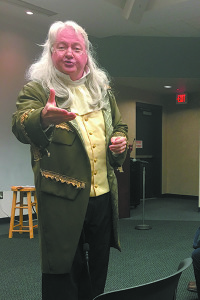[ccfic caption-text format="plaintext"]
By Emily Greffenius
Hometown Weekly Intern
On Thursday, July 19, Dr. Benjamin Franklin made an appearance at the Wakelin Room of the Wellesley Library. He recounted his life growing up in Boston, his adult work as a printer, inventor, and activist, and the crucial part he played in the American Revolution.
As portrayed by professional actor J.T. Turner, Franklin appeared in full period dress and encouraged the audience to participate as he narrated his life story. He cracked jokes, shook hands with audience members, and asked for guesses as to how he earned a living during his time in London (apparently, founding father Benjamin Franklin gave swimming demonstrations in the Thames).
Turner, who has been touring as Franklin for over 12 years, developed and experimented with the character for almost six years before performing regularly. “The biggest problem was figuring out what to leave in about Ben’s life and what to cut,” Turner said during a question and answer session following the presentation.
Even though he clearly could not include everything, Turner did not skimp on the details. He even augmented his performance with newspaper clippings from papers Franklin printed and a copy of Poor Richard’s Almanack, written by Franklin under the pen name of Richard Saunders.
The depth of Turner’s storytelling strengthened the illusion that Benjamin Franklin really was standing at the front of the Wakelin Room, relating anecdotes about his life.
While the evening’s presentation covered the big, famous scenes of Benjamin Franklin’s life, it also included facts and information that might not be found with a casual perusal of Franklin’s Wikipedia page.
Many colloquial phrases still used today, such as “a penny saved is a penny earned,” were originally penned by Franklin. It was also surprising to hear that Franklin sometimes wrote and printed obituaries of his competitors in town in order to further his own printing business.
These more personal and lesser known stories made Franklin come alive for the audience.
Clearly, Turner has an extensive knowledge and admiration for Benjamin Franklin. During the question and answer session, he began answering questions as Franklin, but slowly slipped out of character as he provided more information and insight in Ben’s life. As both Franklin and himself, Turner fondly referred to Thomas Jefferson as “Tom.”
The time and care Turner has poured into this character were evident to everyone in attendance.
J.T. Turner will return to the Wellesley Library on Thursday, July 26, for a presentation on Robert Frost, and on Thursday, August 2, for an evening of New England ghost stories.























